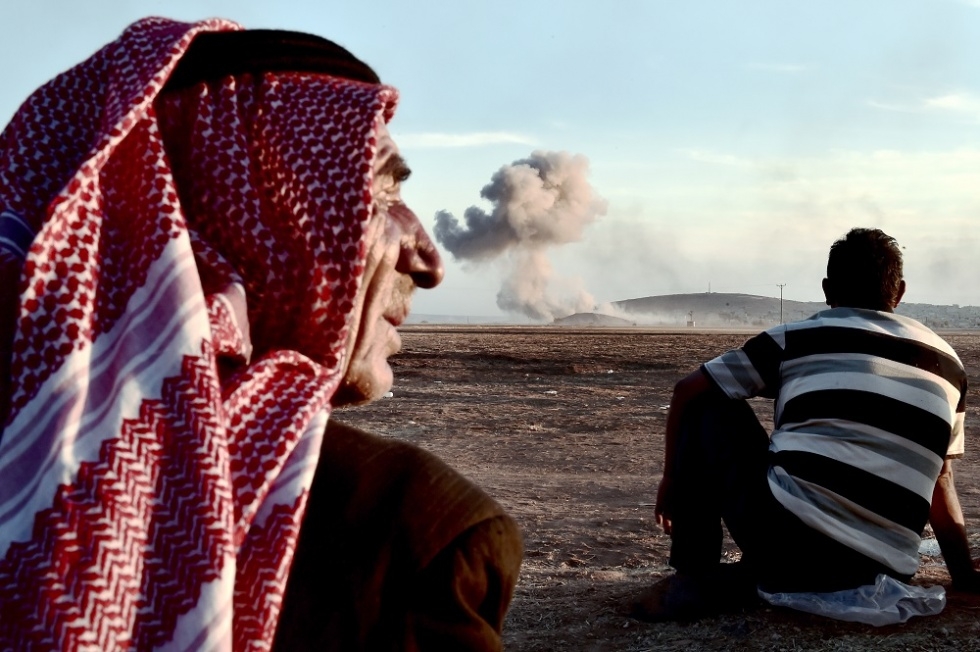Islamic State held off in Kobane but makes inroads in Anbar

Kurdish fighters have reportedly repelled an Islamic State assault on the northern Syrian town of Kobane, but fighting continues with street-by-street guerrilla-like battles taking place.
IS launched a drive to take the town after almost a month of clashes early on Saturday morning and was reportedly trying to cut off the last Kurdish-controlled route out of the town.
However, Kurdish fighters managed to repel the offensive and hold their ground, the Syrian Observatory for Human Rights, a UK-based watchdog said.
Fighting is still ongoing in the southern and eastern parts of the city, Al Jazeera's Stefannie Dekker, reporting from Buyuk Kendirli on the Turkey-Syria border, said.
She also reported that the fighting tactics had shifted and that street battles were now taking places, as opposed to heavy shelling which the two sides were previously inflicting on one another.
The Kurdish People's Protection Unit, known by its Kurdish initials YPG, told Al Jazeera that no side has captured any new territory as yet with a temporary statement now descending on the town.
But fears remain for the 12,000 or so civilians, including 700 mainly elderly people who were unable to flee.
UN envoy for Syria Staffan de Mistura warned that any civilians left in the town "will most likely be massacred" by IS.
Kobane was "literally surrounded," de Mistura said.
"We would like to appeal to the Turkish authorities in order to allow the flow of volunteers at least, and their equipment to be able to enter the city to contribute to a self-defence operation," he added.
Turkey has been deeply reluctant to allow weapons or Kurdish fighters to cross the border despite repeated nights of protests among its own large Kurdish minority that have left 31 people dead.
The situation is complicated by the close ties between the town's Kurdish defenders and the outlawed Kurdistan Workers Party (PKK), which has waged a three-decade insurgency for self-rule in southeastern Turkey that Ankara is determined not to embolden.
Washington has been frustrated over Ankara's reluctance to commit its well-equipped and well-trained forces to the coalition against IS but reported "progress" after two days of talks in Ankara by the coalition's coordinator, retired US general John Allen.
It now seems that Turkey will at the very least train and equip the moderate Syrian opposition, while also further stepping up its efforts to guarantee its long porous border with Syria.
But US officials warned that while world attention is focussed on Kobane, Islamic State militants have been piling pressure on government troops in neighbouring Iraq, leaving the army in a "fragile" position in Anbar province between Baghdad and the Syrian border.
"I think it's fragile there now," one senior US defence official told AFP.
"They are being resupplied and they're holding their own, but it's tough and challenging."
The vice-president of Anbar’s provincial council, Faleh al-Issawi, told The Times of London the province could “fall in 10 days” to IS.
Conrol of Anbar would give IS a clear route into Baghdad.
"If the Islamic State controls Anbar, they would be able to threaten serious targets in Baghdad," Saeed al-Jayashi, an Iraqi security expert, told the Washington Post Friday.
"The government would lose the Haditha dam, and the security forces would have to retreat," he said. "There would be a bloodbath."
"They're so close to Baghdad now," Sajad Jayid, Research Fellow at the Iraqi Institute for Economic Reform told Middle East Eye.
"I mean, they have always been around but they are now literally 20 minutes drive."
Stay informed with MEE's newsletters
Sign up to get the latest alerts, insights and analysis, starting with Turkey Unpacked
Middle East Eye delivers independent and unrivalled coverage and analysis of the Middle East, North Africa and beyond. To learn more about republishing this content and the associated fees, please fill out this form. More about MEE can be found here.

